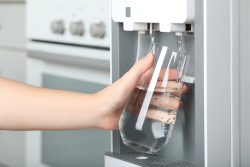The Difference Between Purified Water and Filtered Water

Defining Purified Water:
Purified water refers to water that has undergone a stringent purification process to remove impurities such as chemicals, bacteria, viruses, and other harmful substances. The purpose of purification is to make the water completely free of contaminants, ensuring its safety for consumption. Various methods can be used to purify water, including distillation, reverse osmosis, and deionization.
Understanding Filtered Water:
On the other hand, filtered water is water that has passed through a water filtration system to remove visible particles, sediment, and possible odors. The primary goal of filtration is to improve the water’s taste and appearance by removing larger impurities. Filtration processes typically involve the use of physical barriers or chemical processes to trap and eliminate unwanted substances. Common filtration methods include activated carbon filters, ceramic filters, and sediment filters.
The Purification Process:
The purification process involves more advanced techniques compared to water filtration. Distillation, for instance, is a purification method that involves boiling water and collecting the vapor, leaving behind impurities such as minerals and contaminants. Reverse osmosis, another popular purification method, uses a semipermeable membrane to remove dissolved minerals, chemicals, and microorganisms from the water. Deionization, on the other hand, involves passing water through resins that attract and eliminate impurities by exchanging ions.
The Filtration Process:
Water filtration is a simpler process compared to purification. It involves passing water through various types of filters to physically or chemically remove contaminants. Activated carbon filters, for example, use a porous material to trap and absorb impurities like chlorine, rust particles, and organic compounds. Ceramic filters have small pores that prevent larger particles from passing through, resulting in cleaner water. Sediment filters are designed to capture sediment and larger particles, commonly used as a first line of defense in filtration systems.
Benefits of Purified Water:
Purified water offers several benefits. Firstly, it is free of potentially harmful substances such as heavy metals, chemicals, and microorganisms that can cause health issues. Secondly, the purification process ensures water tastes and smells clean, thus enhancing its overall quality. Finally, purified water is reliable for use in medical facilities, laboratories, and industries where water purity is of utmost importance.
Benefits of Filtered Water:
Filtered water may not reach the same level of purity as purified water but still provides numerous benefits. Firstly, filtration systems remove visible impurities, sediment, and odors, significantly improving the taste and smell of water. This makes filtered water a great option for everyday drinking and cooking purposes. Secondly, filtration products are more affordable and easier to install compared to purification systems, making them accessible for households. Finally, filtering water reduces the consumption of single-use plastic bottles, promoting environmental sustainability.
Drawbacks of Purified Water:
Despite its benefits, purified water does have some drawbacks. Firstly, the purification process removes minerals along with contaminants, resulting in demineralized water. While not necessarily harmful, some argue that demineralized water lacks essential minerals that could contribute to overall health. Secondly, purification systems are often costly to install and maintain, making them less accessible for individuals on a budget. Lastly, the process of purifying water can be time-consuming, especially in larger quantities.
Drawbacks of Filtered Water:
Filtered water, while less expensive and easier to obtain, does have its limitations. Firstly, filtration systems may not remove all contaminants, especially those dissolved in water. It is essential to choose the right filter for the specific impurities you want to eliminate. Secondly, filters need to be regularly replaced to maintain their effectiveness, adding to maintenance costs over time. Finally, filtration alone may not be enough to make highly contaminated water safe for consumption, requiring an additional purification method in certain cases.
Conclusion:
Purified water and filtered water both aim to improve the quality of the water we consume but through different means. Purified water undergoes a more advanced and thorough purification process to remove impurities entirely, while filtered water focuses on enhancing taste and appearance by removing visible particles and odors. Understanding the differences and considering the advantages and disadvantages of both options will help you choose the most suitable solution for your needs. Whether you prioritize total purity or a better-tasting water, there are options available to ensure you have access to safe and clean drinking water.
Got Questions? Let Us Help!
Categorised in: Filtered Water, Purified Water
